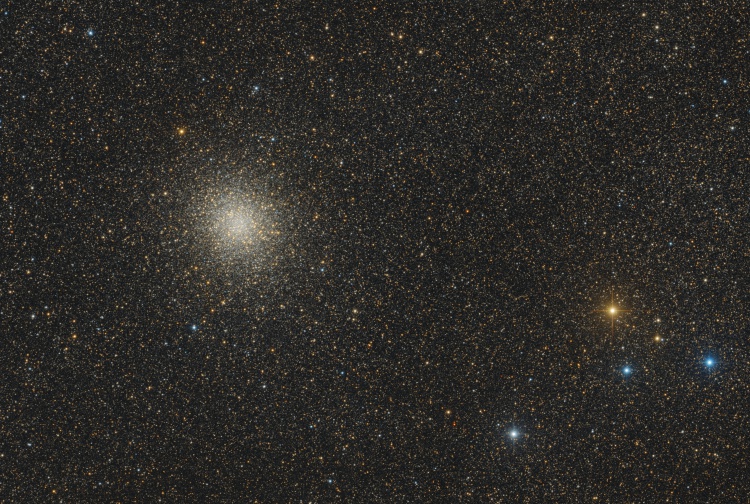One of about 150
Messier 22 is one of about 150 globular clusters in the Milky Way and at just 10 000 light-years away it is also one of the closest to Earth.
Globular clusters are spherical collections of densely packed stars, relics of the early years of the Universe, with ages of typically 12 to 13 billion years. This is very old considering that the Universe is only 13.8 billion years old. It is one of the brightest globular clusters visible from the northern hemisphere, located in the constellation of Sagittarius, close to the Galactic Bulge. Despite its relative proximity to us, the light from the stars in the cluster is not as bright as it should be as it is dimmed by dust and gas located between us and the cluster.
M22 in particular has fascinating additional features: six planet-sized objects that are not orbiting a star have been detected in the cluster, it seems to host two black holes, and the cluster is one of only three ever found to host a planetary nebula — a short-lived gaseous shells ejected by massive stars at the ends of their lives.
Messier 22 is one of about 150 globular clusters in the Milky Way and at just 10 000 light-years away it is also one of the closest to Earth.
Globular clusters are spherical collections of densely packed stars, relics of the early years of the Universe, with ages of typically 12 to 13 billion years. This is very old considering that the Universe is only 13.8 billion years old. It is one of the brightest globular clusters visible from the northern hemisphere, located in the constellation of Sagittarius, close to the Galactic Bulge. Despite its relative proximity to us, the light from the stars in the cluster is not as bright as it should be as it is dimmed by dust and gas located between us and the cluster.
M22 in particular has fascinating additional features: six planet-sized objects that are not orbiting a star have been detected in the cluster, it seems to host two black holes, and the cluster is one of only three ever found to host a planetary nebula — a short-lived gaseous shells ejected by massive stars at the ends of their lives.

IAS - Internationale Amateuersternwarte e.V. - Hakos Observatory, Namibia |
|||||
| Mount |
10Micron GM3000 HPS | Award/published | Astrobin |
||
| Telescope | IAS 10" Newton f/4.5 | ||||
| Camera | QHY268M65 |
||||
| Filter | Chroma LRGB | ||||
| Exposure | L 16 x 60s R/G/B 36/36/35 x 120s |
|
|||
| Total |
3h 50min |
||||
| Software |
PixInsight |
|
|||
| Date |
June 2024 | |
|||
| Location |
IAS Hakos Remote Observatory, Namibia |
||||
